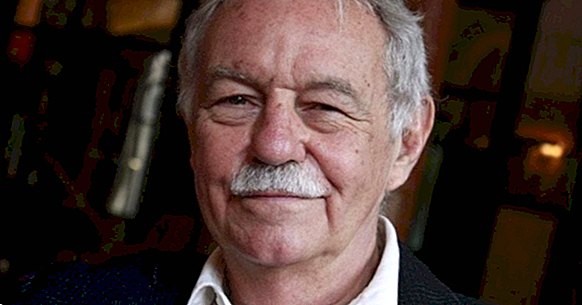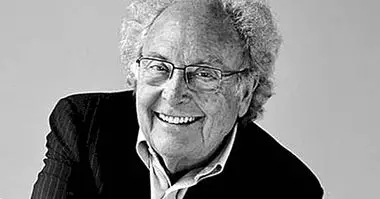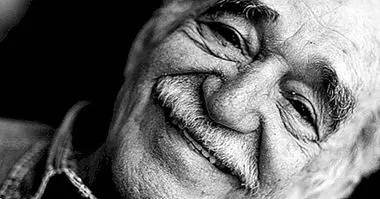The best 70 phrases of Eduardo Mendoza
Eduardo Mendoza (Barcelona, 1943) is a famous Spanish writer. His novels, with a simple style and aimed at all audiences, have been great sales.
Of course, the quality of their stories is always an indispensable requirement, and both critic and public consider Eduardo Mendoza as one of the literary par excellence of the late twentieth century and early twenty-first.
- Related article: "The 70 best phrases of Miguel de Cervantes"
Famous quotes from Eduardo Mendoza
With works of the stature of the truth about the Savolta case, without news of Gurb or the year of the flood, the work of Eduardo Mendoza also covers the trial and theater.
With today's article we want to pay a small tribute to this author by the hand of the best phrases of Eduardo Mendoza.
1. They were days of irresponsible fullness, of imperceptible happiness ...
Poetic fragment of the truth about the Savolta case.
2. It is characteristic of human nature to weaken when dreams begin to materialize.
A reflection that we must take into consideration.
3. That all those locked in there clearly perceive the madness of others but none of their own ...
Fragment of the ladies' toilet adventure.
4. The reduced size of the premises saved cleaning and furniture costs.
Fragment of The truth about the Savolta case.
5. Ancestors and descendants are important. Past and future. Without past and future, everything is present, and present is fleeting.
About time and its limits.
6. You do not know who Franco was, with him there were no freedoms or social justice, but it was nice to watch TV.
A great reflection on the dictatorship in Spain.
7. Do as I do: take advantage of being old. I am not old. Go practicing. Secret to get very old is to grow old very soon.
To keep in mind for the future.
8. It symbolized better than anyone the spirit of an era that today died a little with him.
Fragment of the city of the prodigies.
9. And that all this was achieved alone and without help, starting from scratch based on courage and will?
The Cervantes Institute, on the figure of Eduardo Mendoza.
10. You will wonder how I could have been so successful with men without being worth much. Does not have merit. Men are very demanding when it comes to making aesthetic judgments about women, but at the moment of truth, they settle for anything. When I discovered this, my life became much more interesting. I do not mind admitting that I have used men.
Another paragraph of The ladies' toilet adventure.
11. Luckily a tip solves any problem in a satisfactory way. In this country everything is arranged with a good tip. When I arrived it was hard for me to understand it but now it seems to me a magnificent system: it allows to keep the salaries low and at the same time it stages the hierarchy. The worker charges half and the other half has to thank the master redoubling his servility.
About the city of Madrid.
12. Paquita must have slightly exceeded the age at which a daughter of a good family, especially if she is graceful, intelligent and salesrosa, is married or, at least, promised. Otherwise, as was evidently the case at hand, the interested party used to affect prudery or exaggerate an ease and independence that left no doubt about the voluntariness of her singleness.
Another fragment of Rota of cats.
13. The truth is, in case some reader joins the account of these wanderings without previous knowledge of my background, that in the past I was unjustly imprisoned, although this now does not come to mind, in a penitentiary center for delinquents with mental disorders and that the center was run by Dr. Sugrañes for life and ungenerous methods.
The struggle of the bag and the life.
14. The only thing that I can assure you is that at no time, not even in the most critical, I have seen, as it is usually told, my whole life pass before me as if it were a movie, which is always a relief, because bad enough is in itself to die to die over watching Spanish cinema.
From the same work as the previous fragment.
15. Dedicated all his lecture to a single painting: The death of Actaeon. It was not one of the works exhibited in the Louvre, nor in any other museum. Apparently it belonged and surely still belongs to a lucky individual. (...) the teacher was showing the different details of that curious mythological episode.
Of the same work as the previous one, on a painting with unique details.
16. For some years now, and after some somewhat uneven beginnings, of which in his day he left a written record, he ran a ladies' hairdresser to whom, for a time now, only one employee of la Caixa came with admirable regularity. claim the arrears of their successive credits.
The mystery of the haunted crypt.
17Men are more obtuse: money and football have blocked their hypothalamus and vital fluids do not circulate. On the other hand, women, as soon as they disconnect the mobile, release the powers of the mind and to which you neglect they have already reached the extrasensory perception.
A portrait of the current world.
18. Life has taught me that I have a mechanism inserted in a place impervious to experience that prevents me from doing everything that could benefit me and forces me to follow the most foolish impulses and the most harmful natural tendencies ...
Mendoza, prey to carnal desires.
19. The only thing that did not spare was the money to pay so many people or the suppliers of raw materials. Madrid, according to a phrase coined by a satirical newspaper of the time, held the laces of the bag with its teeth.
Another reflection on commercial activity in the capital of Spain.
20. Human beings, like insects, go through three phases or stages of development: children, workers and retirees. The children do what they are sent, the hard workers too, but with retribution for it, the retirees receive some emoluments, but they are not allowed to do anything ...
About the stages of life.
21. We are more willing to work hard and to be happy, detached, modest, polite and affectionate and not unkind, selfish, petulant, rude and uncouth, as we would certainly be if we did not depend so much on falling into grace to survive.
On the kind nature of the human being.
22. People were unhappy before I was born and will continue to be when I am dead. Truth is that I have caused the misfortune of some, but: I have been the true cause of that misfortune or a mere agent of the fatality?
Another reflection of the city of the prodigies.
23. The language of human beings is laborious and childish ... They talk long and loudly, accompanied by horrible gestures and grimaces. Even so, his capacity for expression is very limited, except in the field of blasphemy and profanity ...
Noise instead of arguments.
24. I do not know when I fell in love with you or how it happened, because I try to remember and it seems to me that I have always loved you and I try to understand and I do not find reason in the world not to love you.
A beautiful declaration of love.
25. This is not a poor country. This is a country of poor people. In a poor country, each one arranges as he can with what he has. Not here. Here it tells what one has or does not have.
On Spain and its miseries.
26. It was admirable to see how those potentates, hit hard by the financial crisis as I had just read a newspaper, still maintained the appearance of waste and fun for the sole purpose of not discouraging the stock markets.
On the stock market.
27. The first time I was attracted by the novelty. I read the notice in the press and said to myself: Fulgencio, here is a companion of misfortunes: out of her element, exposed to public derision by a handful of silver.
Fragment of Three lives of saints.
28. The newspapers talked only about this. Each of the visitors, on returning to their country, said, is converted into an apostle and propagator of what he has seen, heard and learned.
Another great paragraph from The City of the Prodigies.
29. Oh, Barcelona, he said in a voice broken by emotion, how beautiful it is! And to think that when I saw it for the first time of all this that we see now there was almost nothing!
About his hometown, Barcelona.
30. In the end, "he concluded dejectedly," I did not know what I was doing there. I only knew that, whatever it was, it did not make any sense. "This thing you just described," I said, "is called work.
An absurd situation.
31. Because the Catalans always talk about the same thing, that is, about work ... There are no people on the Earth more fond of work than the Catalans. If they knew how to do something, they would be the masters of the world.
A very sharp phrase against the mentality of the Catalan people.
32. The Spaniards speak by the elbows. I'm doing it myself, you see. He kept a moment of silence to show that he could put a stop to national vice and then continued lowering his voice.
In this fragment he tells us about the Spanish idiosyncrasy.
33. At the table sat an old woman with a parchment face, so small and warm that it was difficult to distinguish her from the cushions and gualdrapas irregularly distributed around the piece to disguise the deterioration of the furniture.
Rush of cats.
34. I prefer the barbarism of an inquisitor willing to burn a painting for judging him sinful, to the indifference of the one who only worries about the dating, the background or the quotation of that same painting.
A matter of principles.
35. Throughout my existence I have been forced to solve some mysteries, always forced by circumstances and especially by people when in the hands of these were those.
Autobiographical phrase.
36. (...) Westerners are bad mathematicians. Look at Europe. By arrogance they go from being a set of provinces at war and becoming an empire. He changed national currency by euro and there began decay and ruin.
One of those phrases by Eduardo Mendoza in which he explains some cultural characteristics.
37. Philosophy and religion are very good, of course, but they are for the rich, and if you are rich, why do you want philosophy and religion?
Curious reasoning.
38. Experience has taught me that, in an investigation such as the one I was conducting, little is achieved with force or audacity and much with perseverance.
Being constant is the best way.
39. It's really me who has lost. I thought that being bad would have the world in my hands and yet I was wrong: the world is worse than me.
Small fragment of the city of the prodigies.
40. José Antonio is inconsistent, the party has no program or social base, and his famous eloquence is talking to the salt cellar without saying anything specific ...
Madrid, 1936
41. For centuries we had foreign domination and we were hungry you shit. Now we have learned a lesson, we have taken advantage of opportunities and we have become masters of half the world.
About the ethical misery in the entanglement of the stock market and life.
42. Eastern rhetoric, too subtle, I admit it. Often you do not know what they are talking about and they have already given it to you, as Sun Tzu said.
Sarcastic phrase to take into account.
43. With the same taste I would have eaten a ration of sardines, but I also had to give up because spending money did not fit into my budget.
On the miseries of his early years.
44. It had a thick lower lip, hanging and wet that encouraged to moisten on it the rubberized back of the seals.
Describing one of the characters in The truth about the Savolta case.
45. Spring was announced by blowing into the air that fragrance that has some pleasant vertigo of madness ...
From the same book as the previous fragment.
46. He had unlimited confidence in his ability to overcome any setback and to take advantage of any obstacle.
One of his most read works for young people: No news of Gurb.
47. (...) This fact had already been discussed in the newspapers of the capital. These same newspapers had reached the painful but unquestionable conclusion that it should be so. Communications between Barcelona and the rest of the world, both by sea and land, make it more suitable than any other city in the Peninsula for the attraction of foreigners, they said.
Fragment of the city of the prodigies.
48. María Rosa Savolta examined the contradictory figure of the maid with a severe look. What was that being of steppe and rudeness of dolmen, flat, stooped, dented and mustachioed in a room where each and every object rivaled each other in finesse and delicacy? And who would have put on that starched cap, those white gloves, that apron edged with pointed toes? The lady asked herself.
A mystery to solve.
49. This award is a sign of success, and the desire for success is crazy. Before being reached, success does not exist, it is only cause for anxiety; but when it arrives it is worse: after obtaining it, life does not stop and success overshadows it; nobody can constantly repeat success and after a very short time success becomes a heavy burden; it is needed again, constantly, but now knowing its uselessness.
To have very much in mind.
50. I thought that those who loved me badly would not dare to attack my integrity in full light and in a crowded place, but would try to attract me to where they could carry out their harmful purposes with all discretion. I had, therefore, to avoid loneliness and night. The first thing was to be relatively easy and the second absolutely impossible, if there was not a celestial miracle that neither my beliefs nor my past behavior allowed me to impetrate.
On the enemies and how to treat them.
51. We all have a hard time recognizing that in an irretrievable moment we bet everything on a single spin of the roulette before learning the rules of the game. I also believed that life was something else. Then you continue to play, win and lose alternately, but nothing is the same: the cards are already marked, the dice are loaded and the chips only change their pocket while the evening lasts. Life is like that and it is useless to describe it as unfair afterwards.
A phrase to take life calmly.
52. A criminal is not a hero, but an abject being who abuses the weakness of his neighbor. I was destined to follow this path to the saddest of outcomes if the chance encounter with literature had not opened a crack through which I could leave to a better world. Nothing else I have to add. Literature can rescue gloomy lives and redeem terrible acts; conversely, terrible acts and degraded lives can rescue literature by insufflating a life that, if not possessed, would turn it into a dead letter.
Literature in its purest state, from the pen of Eduardo Mendoza.
53. (...) Velázquez painted this painting at the end of his life. The masterpiece of Velázquez and also his testament. It is an upside-down portrait: it represents a group of trivial characters: girl, servants, dwarves, a dog, a couple of officials and the painter himself.The figure of the Kings, the representatives of power, is reflected in the mirror. They are out of the picture and, therefore, of our lives, but they see everything, they control everything, and it is they who give the painting its reason for being.
Madrid, 1936
54. The author of this article and those who will follow has set himself the task of revealing, in a concise and accessible manner, to the simple minds of the workers, even the most illiterate, those facts that, because they have been presented to the public in dark and diffuse form, after the camouflage of rhetoric and the profusion of figures more appropriate to the understanding and understanding of the learned than of the avid reader of clear truths and not of arithmetic insights, remain still ignored by the working masses who are, nevertheless, its most main victims.
Another fragment of The truth about the Savolta case, his magnum opus.
55. The army remains, of course. But Azaña knows him well: not in vain has he been Minister of War. He knows that the military, under his terrible appearance, are inconsistent, fickle and malleable; on the one hand they threaten and criticize and on the other they whine to get promotions, destinies and decorations; they prey on the perks and are jealous of others: everyone believes that someone with less merits has passed them by; In short, they let themselves be cajoled like children. (...) All weapons (Artillery, infantry, engineers) are to kill each other, and it is enough for the Navy to do one thing, so that the aviation does the opposite.
On the Madrid of the first half of the 20th century.
56. They are not reliable rumors, because, as always, they come from envious or fanciful or stupid people, or all three at the same time, but the mere fact that these people have come up with such an infundium indicates that the truth should not be to walk far from the lie.
You never have to give credit to a rumor.
57. The waiter had his face painted black as a result of continually staining the sweat with the rag to dry the glassware.
Description contained in The tangle of the stock market and life.
58. Beware of the ears, I said by way of colophon; they always appear where one least expects them.
Excerpt from one of his books.
59. From that time I remember throwing my time overboard with joy, in the hope that the balloon would take off and take me to a better future.
About his young times.
60. You always think better with a full stomach, say those who have a stomach.
Ironic phrase that invites reflection.
61. And what is the truth? Sometimes the opposite of the lie; other times, the opposite of silence.
Sometimes just shouting embodies reality.
62. The feeling is the root and the sustenance of deep ideas.
Philosophical phrase about emotions.
63. No human behavior needs precedents to be possible.
Culture is everything, sometimes.
64. Early vocations are trees with many leaves, little trunk and less root.
Great poetic prose.
65. In the literature class they taught us some things that did not help me then, and today they have served me little.
Unfortunately, interest in art and literature can not be explained or taught.
66. Have I ever wondered if Don Quixote was crazy or if he pretended to be mad to transgress the doors of a small, clumsy and closed society.
The limits of madness and sanity.
67. I wanted to do like Alonso Quijano: run the world, have impossible loves and undo wrongs.
Like the famous character of Cervantes.
68. There is another kind of humor in the writing of Cervantes, which is not so much in the writing or in the dialogues as in the writer's gaze.
Another reflection on the work of Manchego.
69. I believe to be a model of good sense and I think that others are like a shower, for this reason I am perplexed and frightened by how the world is.
About his vision of things.
70. A novel is what it is: neither the truth nor the lie.
Neither fiction, nor reality, but a middle ground.



















